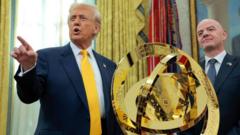Will President Trump Attend the Club World Cup Final?

The United States as Co-Hosts of the 2026 World Cup: A Historic Moment in Sports
The selection of the United States as a co-host for the 2026 FIFA World Cup, alongside Canada and Mexico, marks a significant milestone in the history of sports in North America. This decision, made during Donald Trump's first term as president, has implications that extend beyond mere logistics and into the realm of international relations, economics, and the cultural fabric of the region. This article explores the context, significance, and potential ramifications of this historic event, as well as the relationships between FIFA, the U.S. government, and global sports.
Background: The Bid for the World Cup
The 2026 FIFA World Cup will be the first tournament to feature an expanded format, allowing for 48 teams to compete. This expansion not only reflects FIFA's desire to increase global participation but also emphasizes the growing popularity of soccer in North America. The joint bid from the United States, Canada, and Mexico was a collaborative effort that showcased the strength of soccer in these countries.
Donald Trump's administration played a pivotal role in supporting this bid. The establishment of a task force dedicated to overseeing preparations for the World Cup indicated a commitment to ensuring that the tournament would be a success. This governmental backing has been essential in securing the necessary resources and support from various sectors.
The Role of FIFA and U.S. Government
FIFA's decision to open an office in Trump Tower was symbolic of the increasing collaboration between the governing body of world football and the U.S. government. FIFA President Gianni Infantino noted that having a presence in New York would strengthen FIFA's relationship with the U.S. administration. This relationship is crucial for the successful organization of the World Cup and the Club World Cup, as both events require extensive coordination and resources.
The Potential Impact of Trump's Administration on Global Sports
Trump's presidency has been marked by a more pronounced engagement with the world of sports. His attendance at significant sporting events, such as the Super Bowl and UFC showcases, has highlighted the intersection of politics and sports in America. However, his administration's policies, particularly regarding immigration, have raised concerns about how they may affect international participation in sporting events.
The immigration policies and travel bans implemented during Trump's tenure could potentially deter foreign fans and athletes from attending the World Cup. Despite assurances from FIFA that fans would be welcomed, the reality of increased travel restrictions could impact attendance and the overall atmosphere of the tournament.
Economic Implications of the World Cup
Hosting the World Cup is not just a matter of prestige; it is also an economic opportunity. The influx of tourists, media attention, and international visitors can lead to significant economic benefits for the host cities. According to estimates, the 2026 World Cup is expected to generate billions in revenue through tourism, merchandise sales, and local business engagement.
- Tourism Boost: The World Cup will attract thousands of fans from around the globe, leading to increased hotel bookings, restaurant patronage, and overall tourism spending.
- Infrastructure Development: The need for stadium improvements and transportation infrastructure upgrades will create jobs and stimulate local economies.
- Global Exposure: Hosting the tournament provides a platform for cities to showcase themselves to a global audience, potentially attracting future investment and tourism.
Challenges Ahead for the 2026 World Cup
While the prospect of hosting the World Cup is exciting, there are challenges that need to be addressed. These include:
- Logistical Coordination: Coordinating between three countries requires extensive planning and collaboration to ensure that facilities, accommodations, and transportation are top-notch.
- Security Concerns: With the potential for large crowds comes the need for heightened security measures, particularly in light of Trump's stringent immigration policies and concerns over safety.
- Public Reception: The political climate surrounding Trump's presidency may affect public enthusiasm and engagement with the event.
Community Engagement and Cultural Significance
The World Cup presents an opportunity to engage communities and promote soccer at the grassroots level. Local organizations, youth clubs, and schools can benefit from increased interest in the sport, leading to enhanced participation and development programs. Additionally, the cultural exchange that occurs during such a global event can foster understanding and appreciation for diverse cultures.
Community involvement can also help counterbalance any negative perceptions related to the political climate. By focusing on the spirit of sport and unity, the World Cup can serve as a vehicle for positive change and engagement.
Conclusion: A Moment of Transformation
The 2026 FIFA World Cup, with its unique co-hosting arrangement, is poised to be a historic event that transcends sports. It presents an opportunity for the United States, Canada, and Mexico to showcase their shared love for soccer while navigating the complexities of international relations and domestic politics. As preparations unfold, the success of this tournament will depend not only on organizational efficiency but also on the collective spirit of the communities and fans involved.
As we look forward to this monumental event, one question remains: How will the dynamics of politics and sports continue to shape the narrative of the 2026 World Cup and beyond?
FAQs
What is the significance of the 2026 World Cup being co-hosted by the U.S., Canada, and Mexico?
The co-hosting arrangement reflects a collaborative effort to promote soccer across North America and showcases the growing popularity of the sport in the region. It also allows for a larger tournament format, which enhances global participation.
How will Trump's immigration policies affect the World Cup?
Trump's immigration policies may deter some international fans and athletes from attending the tournament, potentially impacting attendance and the overall experience. However, FIFA has assured that efforts will be made to welcome all fans.
What economic benefits can be expected from hosting the World Cup?
Hosting the World Cup can lead to significant economic benefits, including increased tourism, job creation, and global exposure for host cities. It can also stimulate local businesses and improve infrastructure.
What challenges are anticipated in preparing for the 2026 World Cup?
Challenges include logistical coordination between three countries, security concerns, and public reception amid the political climate. Addressing these challenges will be crucial for a successful tournament.
As the world gears up for this historic event, what role do you think sports will play in bridging cultural divides and fostering unity? #WorldCup2026 #Soccer #SportsPolitics
Published: 2025-07-09 07:54:13 | Category: sport



